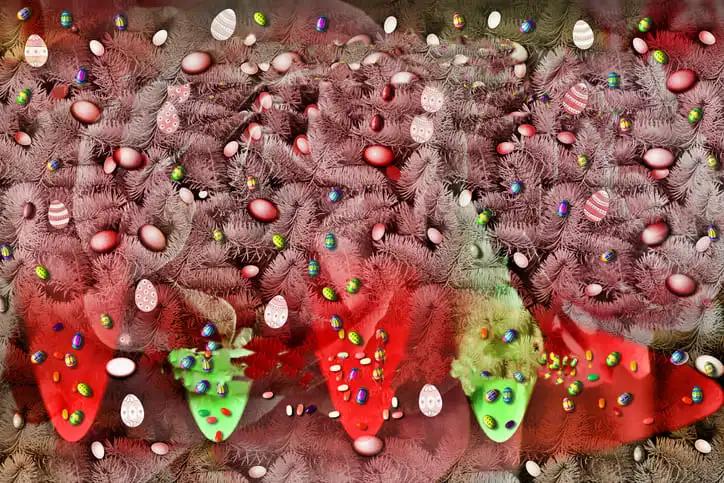KEY TAKEAWAYS
- The randomized, phase 3 S1826 trial was conducted to evaluate N-AVD versus BV-AVD in patients with AS HL.
- Eligible patients who were 12 years or older with stage 3-4 HL were randomized in a 1:1 ratio to receive either 6 cycles of N-AVD or BV-AVD.
- N-AVD proved to be more effective in improving PFS than BV-AVD in patients with AS HL.
In the S1826 trial comparing Nivolumab(N)-AVD and Brentuximab Vedotin(BV)-AVD in patients with newly diagnosed advanced stage (AS) classic Hodgkin lymphoma (HL), eligible patients aged 12 years and above age with stage 3-4 HL were randomized 1:1 to receive 6 cycles of either N-AVD or BV-AVD.
When using BV-AVD, G-CSF neutropenia prophylaxis proved necessary, while it was optional with N-AVD. Pre-specified patients were eligible to undergo RT for residually metabolically active lesions on end-of-treatment PET. The patients were categorized by age, international prognostic score (IPS), and intention to use RT. The researchers used the 2014 Lugano Classification to assess response and disease progression. The primary endpoint was progression-free survival (PFS), with secondary endpoints including overall survival (OS), event-free survival, patient-reported outcomes (PROs), and safety.
Out of the 994 patients, 976 were randomized to N-AVD (n = 489) or BV-AVD (n = 487). The median age of the patients was 27 years, ranging from 12 to 83 years. The 56% of the patients were male, while 76% were white, 12% were black, and 13% were Hispanic. Additionally, 24% of the patients were under the age of 18, while 10% were over the age of 60, 32% of the patients had an IPS score of 4-7.
The primary PFS endpoint crossed the protocol-specified conservative statistical boundary at the planned 2nd interim analysis (50% of total PFS events). A total of 30 PFS events took place after N-AVD compared to 58 events after BV-AVD. The N-AVD arm had a superior PFS with a median follow-up of 12.1 months. In the N-AVD treatment group, PFS showed significant superiority with a hazard ratio (HR) of 0.48 and a 99% confidence interval (CI) of 0.27–0.87 (one-sided p-value = 0.0005). The 1-year PFS for N-AVD was 94%, while that of BV-AVD was 86%. Eleven deaths were observed after BV-AVD (7 due to adverse events, AE) compared to 4 after N-AVD(3 because of AE). The rate of grade (gr) ≥3 hematologic AE was higher after N-AVD at 48.4% compared to 30.5% after BV-AVD, with gr ≥3 neutropenia being 45.1% after N-AVD and 23.9% after BV-AVD. The rates of febrile neutropenia (5.6% N vs. 6.4% BV), pneumonitis (2.0% N vs. 3.2% BV), ALT elevation (30.7% N vs. 39.8% BV), and colitis (1% N vs. 1.3% BV) were similar between the two treatments. However, hypo/hyperthyroidism was more common after N-AVD (7%/3% N vs. <1% BV). Peripheral neuropathy was more frequent after BV-AVD (sensory: 28.1%, 1.2% gr ≥ 3 N vs. 54.2%,7.8% gr ≥ 3 BV; motor: 4% N vs. 6.8% BV).
The S1826 study indicated that N-AVD treatment has improved the PFS of patients with AS HL when compared to BV-AVD treatment. Moreover, immune-related adverse events (AEs) were minimal and radiation therapy was given to less than 1% of the patients. However, longer follow-up is required to assess the OS and PROs.
Source: https://onlinelibrary.wiley.com/doi/10.1002/hon.3163_5
Clinical Trial: https://classic.clinicaltrials.gov/ct2/show/NCT03907488
Herrera, A. F., LeBlanc, M., Castellino, S. M., Li, H., Rutherford, S. C., Evens, A. M., Davison, K., Punnett, A., Hodgson, D., Parsons, S. K., Ahmed, S., Casulo, C., Bartlett, N. L., Tuscano, J. M., Mei, M. G., Hess, B. T., Jacobs, R., Saeed, H., Torka, P., Friedberg, J. W. NIVOLUMAB(N)-AVD IMPROVES PROGRESSION-FREE SURVIVAL COMPARED TO BRENTUXIMAB VEDOTIN(BV)-AVD IN ADVANCED STAGE (AS) CLASSIC HODGKIN LYMPHOMA (HL): RESULTS OF SWOG S1826. Hematological Oncology, 41, 33-35. https://doi.org/10.1002/hon.3163_5



